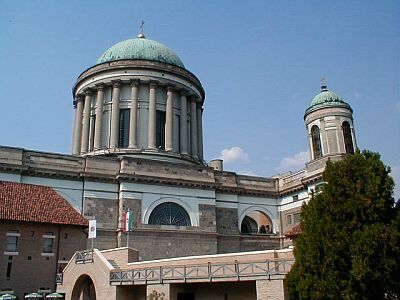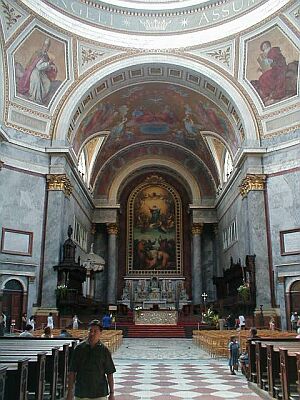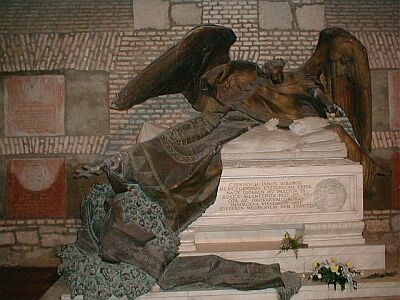Official Name
Esztergom. The former German name of the town, used during the Habsburg monarchy, is Gran.
Location

| ||
| Esztergom |
Esztergom lies in the central part of Northern Hungary and marks the western entrance to the Dunakanyar (Danube Bend). A few kilometres east of Esztergom, the Danube bends sharply before it flows to the south. Esztergom stretches along the right (eastern) bank of the Danube. The left side of the river is already →Slovakia territory. Around 60 kilometres downstream starts the capital →Budapest.
Population
About 30,000.
Orientation
Esztergom is clearly dominated by the giant cathedral on the top of a hill next to the rivershore. To cut a long story short: The town itself is not really interesting. The train station is far away from it all in the south of the town. From there it's a 10 minutes walk northwards to the bus station. And another 15 minutes to the centre of town. The cathedral can't be missed. Between the town and the Danube, there's the 'small Danube' and a large island, connected to the town with a bridge. There are some campsites on the island and a ferry pier. From there, ferries cross the river to the →Slovakia side.
History
Esztergom appears to be a very old town. Chronicles say that Marcus Aurelius, one of the most famous politicians of the ancient Rome, wrote the 12th book of the Meditations in present-day Esztergom. The town itself wasn't really important before the year 1000 AD. The father of St Stephen, prince Géza, chose the place as his residence. And so his son St Stephen was born, baptized and crowned in Esztergom. The first Hungarian church was built here, and Magyar tribes were christianized from here. At that time, the rulers lived on the top of the hill and the clergy in the lower town.
After the devastating Mongolian invasion in 1241, the rulers decided to move to →Buda, but the clergy remained in Esztergom and showed great interest in the vacant properties. So they moved to the place which is occupied by the cathedral today. Esztergom became the seat of archbishop for many centuries. Later on, the Ottomans destroyed Esztergom, but most of the town was rebuilt in the 18th and 19th century.
Getting there / transportation
Several daily trains connect Esztergom with →Budapest Nyugati pu.. By train, it takes 1½ hrs, the fare is around 400 Ft. There are also many buses, some of them run via Visegrád and →Szentendre. The fare to the latter is 450 Ft.
Several ferries a day cross the Danube and stop at Stúrovo in →Slovakia. It takes less than 5 minutes. In summer, it's also possible to go to Budapest by boat.
The main reason to go to Esztergom is of course the Fõszékesegyház (Cathedral), which can already seen from far away. The church itself is 118 metres long, the main dome is 100 metres tall. This makes the Basilica of Esztergom, as it is also refered to, the largest church of Hungary.

| ||
| The Basilica of Esztergom |
Most of the church as it can be seen today was built during 1822 and 1869 in the neo-classicistic style. Before that, there was the St. Adalbert church from the 11th century, but this church was destroyed by the Ottoman invaders. A part of the old church, namely the red and white Bákocz Chapel made of marble and dating back to the year 1510, was transfered to the southern edge of the cathedral.

| ||
| Inside the main hall of the cathedral |
It goes without saying that the inside of a church as big as Esztergom Cathedral is very impressive. Among other things, there's an 800-year old library with several precious scripts of the medieval period inside the church.

| ||
| Tomb inside the crypt of the Cathedral |
A proper church has a crypt, and the crypt below Esztergom Cathedral is particularly impressive. Many bishops from Esztergom are buried here and their tombs are real masterpieces. Besides that there's also a treasury with several coronation and other robes as well as gold and silver accessories.
The park around the cathedral as well as the view over the river from there make for a nice stroll. Furthermore, Esztergom offers a few museums - among them the large Christian Museum.
Only a few kilometres downstream and right at the Danube Bend, there's the small and very old town of Visegrád. This town was used as the Hungarian king's second home so to say. A large citadel was built on the top of a hill towering above the Danube valley, but the Austrians destroyed the citadel. The monarchy was afraid that rebels might use the citadel as a stronghold. The Royal Palace not far from the rivershore was destroyed by the Ottomans. Yes, even centuries ago the place was popular with visitors.
On the other (left) side of the river Danube and not far from Visegrád is another highlight - Vác, once an autonomous Christian district. It was also destroyed by the Ottomans, but the pope himself took care of the reconstruction. And so there's plenty to see again: A cathedral and other interesting buildings, surrounded by a nice park.
Continuing downstream, there's another beautiful town on the right side: →Szentendre. Actually the entire rivershore between Esztergom and Szentendre is really scenic - the Danube valley is quite narrow and the hills almost touch the river.
Campsites, hotels, pensions etc - everything can be found in and around Esztergom. Not many visitors stay in Esztergom - most of them return to Budapest. So did we, that's why I can't recommend a specific place.
- www.visitors.hu/04_01_en.html Historic facst and several pictures of Esztergom.
Do you have or do you know a good website about Esztergom? Don't hesitate, let me know! After checking it, I would love to add it to the link list. You can submit a link by using the →contact form. Note that commercial websites will be treated differently.
©2024 Europe-East.com

 Albania
Albania Hungary
Hungary